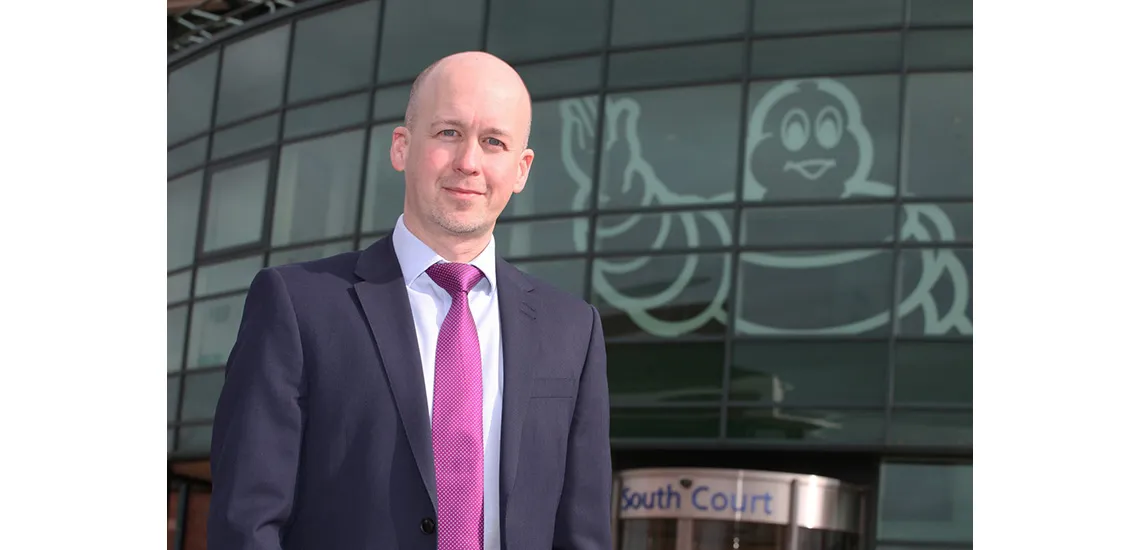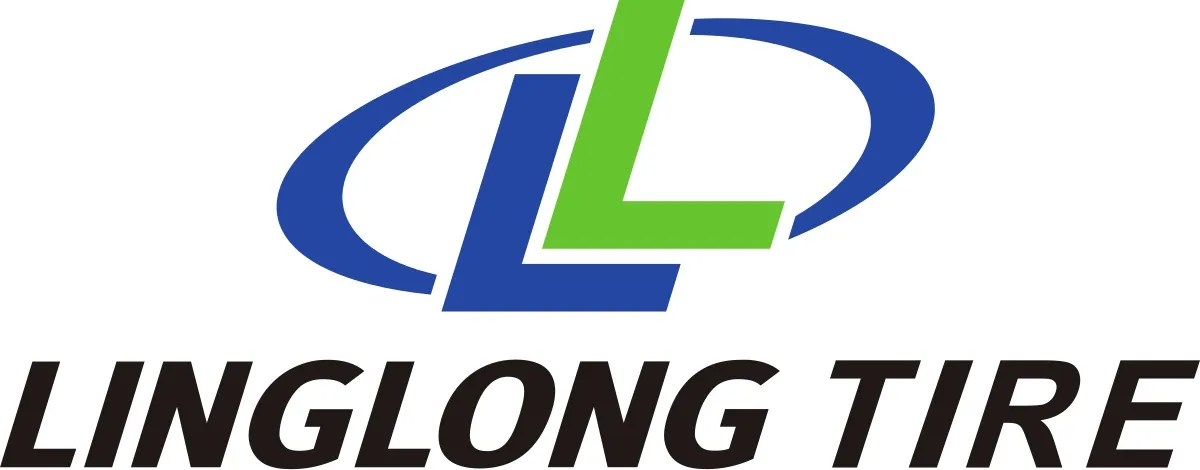Part 2 of our Bus Feature for Commercial Tyre Business welcomed the insight of Andrew French, Michelin’s Director of Services and Solutions for the UK, Ireland and Nordics.
Michelin’s Perspective on the Coach and Bus Sector
Recent updates from SMMT have underlined the difficulties facing the bus and coach sector as repercussions from the COVID-19 pandemic continue to be gravely felt with a 32% drop in registrations in 2020.
French began by commenting on the business impact seen by Michelin, “In terms of the business impact, we have obviously seen the mileages of bus operators reduce over the course of the past year. The severity of the reduction has been different across various regions of the UK, impacted by the number of Covid cases and the restrictions in place.”
So, what has been Michelin’s strategy in order to negate the turbulence caused by the pandemic? French was clear in stating that they have stayed very close to their customers to ensure good communication channels are maintained.
He said, “To manage that situation, we have stayed very close to our customers, ensuring good communication channels are in place so we can adapt to the different needs and activity levels of each business.”
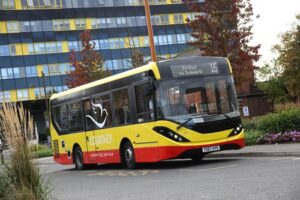
In terms of Michelin’s internal measures French explained that the first objective of the company was to protect their employees and customers. This in his words was a “top priority”.
French expanded on this, “We adapted our existing health & safety policies – that were already very strong – to include all COVID-19 protocols. This allowed our tyre technicians in the bus garages to continue their important roles as key workers throughout the pandemic.
“We put a huge emphasis on ensuring our health & safety policies were as stringent as possible to best protect our staff and our customers.”
Furthermore, Michelin used the government’s furlough’s scheme due to the decreased mileage seen within their contracted bus fleets, but French was keen to highlight that this was used only where necessary. Aside from this, Michelin collaborated closely with their customers across the UK, whether this was via their operations or commercial teams, to get the latest insights and data together to effectively manage their business.
We were eager to discover how Michelin viewed which sectors had emerged with less damage than others within the bus and coach sector, but it was clear to see that all sectors have felt the heavy blows dealt by COVID-19.
French detailed, “Every sector has been impacted, but coach travel has been the most severely hit. During the first lockdown, almost every vehicle was parked up, and the situation has remained very challenging during 2020 and into 2021.”
The complications arising from the inactivity in the sector further illustrates Michelin’s prudence in enhancing their communication channels with their customers and supporting them as and when necessary during this challenging period. This level of support will once again be key when bus and coach operators start the process of scaling up their operations.
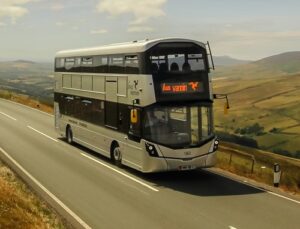
From the point of view of our sister publication, Retreading Business, we are always intrigued by how the balance between budget tyres and retreads will be as we close out 2021 and move into 2021. We asked French how he viewed the impact to the market in terms of brand sectors specifically in terms of budget tyres and retreads. He had positive news for the retreading sector.
The Director of Services and Solutions for the UK, Ireland and Nordics said, “we don’t anticipate an increase in demand for budget tyres in this market – public transport is a premium part of the market. What we will certainly be promoting is the Michelin philosophy in terms of retreading and regrooving to lengthen the life of the tyres, working in line with the Michelin 4R strategy: Reduce, Reuse, Recycle, and Renew.”
The willingness to promote Michelin’s philosophy in terms of retreading and regrooving goes hand in hand with the continued trend towards the environment and sustainability in the market as well as its products.
French explained, “The main differences (in the market) are likely to come in terms of the environmental aspect. We anticipate more alternative fuel vehicles on the road, more hydrogen and battery powered electric vehicles to meet an increase in zero emission zones and clean air zones.
“There will also be more of a focus on sustainable and ethical buying practices which are likely to be accelerated by the pandemic. I can see operators taking advantage of this period of reflection that we’ve been in and, as a business, we need to be ready for that. We want to be able to help our customers achieve their environmental ambitions in the years ahead.
“We have to be ready to continue leading the way with environmentally friendly products and services that deliver positive environmental impacts for our customers, to help bus operators reduce carbon emissions and meet their corporate social responsibility targets.”
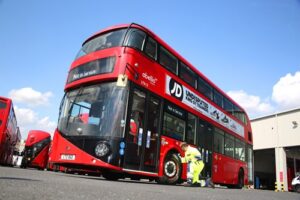
As for the post-COVID impacts in terms of travelling and commuting, French suggested that it may not be all doom and gloom despite the higher proportion of people working from home pointing out that what happens between rail and bus could change as well.
French stated, “We certainly see a change happening. There will be more working from home, which will affect mileage, but what happens between rail and bus could change as well – and there might be a positive impact for bus operators there.”
That is all much further down the road though. With over 18 million people receiving the first dose of their vaccination in the UK, brighter times do lie ahead, but Andrew French stressed the critical nature of the few months ahead and how Michelin view the first half of 2021.
“There are still a few tough months ahead. But I think we can see green shoots of recovery. The vaccination roll-out seems to be going well and, as the year goes on, we can start to be more optimistic. The Bank of England is predicting strong growth as we gradually come out of lockdown.”
In terms of strategy for 2021, Michelin will continue to work closely with bus operators up and down the country and adapt to anything that is thrown our way in terms of the public transport space.
French drilled down further into Michelin’s approach, “We will stay very close to our bus operators and adapt to the changes in terms of public transport behaviours. There will naturally be more people working from home for the foreseeable future, for example, and that will have an impact.”
COVID-19 hasn’t been the only external market influence making its presence known in the UK Market. Brexit has also had the potential to heavily disrupt mobility in the UK as well as in Europe itself. Therefore, contingency planning for all players in the sector was of paramount importance, including Michelin.
Andrew French outlined Michelin’s approach to the situation, “Like most businesses, we had a number of Brexit contingency plans in place, some of which have come in to play and we feel like we have come through the early period in good shape.”
There were a few tweaks to plans, in terms of tyre supply and lead times for example, but there has been no drop off in service levels. Things will only improve as the year progresses, with people becoming more accustomed to the processes.”
Brexit like COVID-19 will continue to shape the conversation in the bus and coach sector in the same way as most sectors in the tyre industry in 2021, but it is one that with Michelin’s resources and firepower that they will be more than ready to safely navigate.

